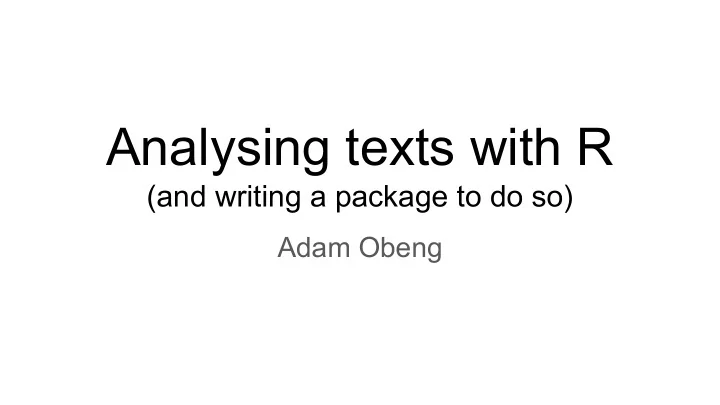

Analysing texts with R (and writing a package to do so) Adam Obeng
About me: Adam Obeng Computational Social Scientist (i.e. Data Scientist, Research Scientist, etc.) ABD PhD in Sociology at Columbia Jared taught me R adamobeng.com
About me: Adam Obeng Computational Social Scientist (i.e. Data Scientist, Research Scientist, etc.) ABD PhD in Sociology at Columbia Jared taught me R adamobeng.com Lucasarts
quanteda and readtext Kenneth Benoit [aut, cre], Paul Nulty [aut], Kohei Watanabe [ctb], Benjamin Lauderdale [ctb], Adam Obeng [ctb], Pablo Barberá [ctb], Will Lowe [ctb]
Quantitative Text Analysis
Quantitative Text Analysis Text as data: ● Linguistics ● Computer science ● Social sciences -> QTA Roberts, Carl W. "A conceptual framework for quantitative text analysis." Quality and Quantity 34.3 (2000): 259-274.
QTA assumptions ● Texts reflect characteristics ● Texts represented by features ● Analysis estimates characteristics
QTA: Documents -> Document-Feature Matrix -> Analysis Ken Benoit, The Quantitative Analysis of Textual Data (NYU Fall 2014)
Outline ● Loading texts (descriptive stats) ● Extracting features ● Analysis: supervised scaling + Digressions about the process of writing an R package
QTA Step 1: Loading texts Demo
Digression #1: how do we make it simple? ● v1.0 API changes to meet ROpenSci guidelines ○ namespace collisions ● Introducing readtext
Digression #1: readtext readtext( file, ignoreMissingFiles = FALSE, textfield = NULL, docvarsfrom = c("metadata", "filenames"), dvsep = "_", docvarnames = NULL, encoding = NULL, ...)
Digression #1: readtext ● plaintext any (possible) combination of those ● delimited text “any” encoding ● doc ● docx ● pdf ● JSON, line-delimited JSON, Twitter API output > readtext('path/to/whatever') ● XML ● HTML just works™ ● zip, .tar, and .gz archives ● remote files ● glob paths
Digression #1: listMatchingFiles From a pseudo-URI, return all matching files Given that: - A URI can resolve to zero or more files (e.g. '/path/to/*.csv' , ‘https://example.org/texts.zip’) - Globbing is platform-dependent (e.g. '/path/to/\*.tsv' escaping) - Recursion
Digression #1 sub-digression #1 Some people, when confronted with a problem, think “I know, I'll use regular expressions.” Now they have two problems. — jzw
Digression #1 sub-digression #1 Some people, when confronted with a problem, think “I know, I'll use regular expressions.” Now they have two problems. — jzw
Digression #1: listMatchingFiles ● If it’s a remote file, download it ● If it’s an archive, extract it, glob the contents ● If it’s a directory, glob the contents -> Call listMatchingFiles() on the result Termination condition: was it a glob last time? (a glob cannot resolve to a glob) https://github.com/kbenoit/readtext/blob/98dbccc9a3ac07f387ef94bcfecab0eb5282dc5b/R/utils.R#L87-L222
QTA Step 2: Extracting features text -> dfm ● Feature creation (NLP) ○ tokenizing ○ removing stopwords ○ stemming ○ skip-ngrams ○ dictionaries ● Feature selection ○ Document frequency ○ Term frequency ○ Purposive selection ○ Deliberate disregard
Demo: extracting features
QTA Step 3: Analysis Supervised scaling Goal: differentiate document characteristics e.g. where do they (or their authors) fall on the political spectrum
QTA Step 3: Analysis Supervised scaling Like ML classification, but continuous outcome: ● Get training (reference) texts ● Generate word scores in training texts ● Score test (virgin) texts ● Evaluate performance Wordscores Laver, Michael, Kenneth Benoit, and John Garry. "Extracting policy positions from political texts using words as data." American Political Science Review 97.02 (2003): 311-331.
QTA Step 3: Analysis Supervised scaling demo
Digression #2: Testing “Do you want your results to be correct or plausible?” — Greg Wilson True for ML and for code
Digression #2: Testing ● Use CI as source of truth, not local tests (even with --as--cran) ○ (Still might not match CRAN) ● Enforce test coverage ● Test coverage is per-line https://travis-ci.org/kbenoit/readtext https://travis-ci.org/kbenoit/quanteda https://codecov.io/gh/kbenoit/readtext https://codecov.io/gh/kbenoit/quanteda
Digression #2: Testing We discovered a lot of our own bugs
Digression #2: Testing Sometimes it’s R’s fault base::tempfile() : (usually) different filenames within the same session base::tempdir() : always the same directory name within the same session readtext::mktemp() behaves like GNU coreutils mktemp
Digression #2: Testing Sometimes it’s R’s fault *crickets* If you know what’s going on: http://r.789695.n4.nabble.com/readlines-truncates-text-file-with-Codepage-437-en coding-td4721527.html
Digression #2 sub-digression #1: how to win at GitHub
Digression #2 sub-digression #1: how to win at GitHub
Thanks! Slides and code: adamobeng.com References: ● Ken Benoit, The Quantitative Analysis of Textual Data (NYU Fall 2014) ● — , Quantitative Text Analysis (TCD)
HERE BE DRAGONS (Additional slides)
QTA Step 3: Analysis Unsupervised scaling Problems with Wordscores: 1. “the positions themselves are abstract concepts that cannot be observed directly” 2. the set of words may change over time Wordfish Slapin, Jonathan B., and Sven ‐ Oliver Proksch. "A scaling model for estimating time ‐ series party positions from texts." American Journal of Political Science 52.3 (2008): 705-722.
QTA Step 3: Analysis Unsupervised scaling: Wordfish Naive Bayes with Poisson distributional assumption
QTA Step 3: Analysis Unsupervised scaling demo
Digression #1: non-breaking spaces
Digression #1: non-breaking spaces
Digression #1: non-breaking spaces ⌥ Opt+3 -> # ⌥ Opt+Space -> \xa0 Solution: pre-commit hook
Back to the demo: loading text and descriptive stats
Digression #4: Git is a literal genie
Digression #4: Git is extremely elegant Git for Computer Scientists But the porcelain is equally difficult to use
Digression #4: Git needs additional constraints Don’t allow commits to master: git-flow?
Documents Usually texts, but also paragraphs, etc.
Features - words - n-grams - skip-grams - dictionaries - phrases - manual coding - etc.
Analysis ● Descriptive stats ● Supervised scaling and classification ● Unsupervised scaling ● Clustering and topic models
Recommend
More recommend